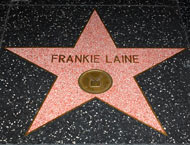Frankie Laine

Stars


Frankie Laine was a singer with a booming voice who hit it big with such songs as "That Lucky Old Sun," "Mule Train," "Cool Water," "I Believe," "Granada" and "Moonlight Gambler."
Laine was born Francesco Paolo LoVecchio on March 30, 1913, the eldest of eight children of Sicilian immigrants who settled in the Little Italy neighborhood of Chicago. His father was a barber whose customers included Al Capone; his maternal grandfather was the victim of a mob hit. Laine said he came from a "big and poor but happy" family.
As a youngster, Laine sang in the all-boy choir at church, but first became excited about music when he listened to one of his mother's records on a windup Victrola: Bessie Smith singing "Bleeding Hearted Blues" with "Midnight Blues" on the flip side.
"The first time I laid the needle down on that record I felt cold chills and an indescribable excitement," Laine said.
The record was his first exposure to jazz and the blues, which drew him into music.
At 18, with the Depression underway and his father out of work, Laine hit the road as a dance marathoner. Altogether, he participated in 14 marathons, coming in first on three occasions. He and his partner, Ruthie Smith, made it into the Guinness Book of World Records for dancing 145 days straight (although he disputed Guinness, saying that he and Smith danced for 146 days).
He didn't hit it big as a singer until his mid-30s. Until then, he lived the tough life of an undiscovered musician in the depths of the Depression. He traveled from city to city, often without enough money for a hotel or a decent meal.
Times like that, which he described in his autobiography, were not unusual: "Armed with $40 and a letter of introduction from Hoyt [Kline]" — a friend of Louis Armstrong — "I headed off for my second shot at New York. With my club experience and those new songs, I figured I'd be singing in about a week. It took me three days to get in to see the radio executive, and 15 minutes for him to show me the door."
Before long, he had used up "my pathetic little bankroll" going from club to club for auditions. He would sneak into hotels and sleep on the floor — at least until he got thrown out. Then he got a break — an audition at WINS radio, where he got a $5-a-week job singing on a live half-hour show.
It was the WINS program director who changed his name from Frank LoVecchio to Frankie Lane. (Laine altered the spelling to avoid confusion with another singer with the same last name.)
Years more of moving around, working other jobs and testing his talent eventually brought him to Los Angeles, where he hung out at clubs such as Slapsy Maxie's and Billy Berg's. It was at Billy Berg's that he met Duke Ellington, Art Tatum and many other legends. And it was there that he would occasionally get to sing free before eventually being hired.
Even this did not provide an unbroken ladder to success, but eventually Laine got a chance to record a few songs for Mercury Records. He decided he wanted to do an old song he had heard years ago, "That's My Desire," but he couldn't remember it well enough to sing it the way it was written, so he improvised.
"Desire" was the song that proved to be the breakthrough for Laine, although it took almost a year. First it hit the so-called Harlem pop charts, which recorded sales to black record buyers.
"That didn't surprise me," Laine said. "In my leaner days I failed many an audition because, I was told, I sounded 'too black.' ... I'm certain the confusion was the direct result of the music that influenced me while I was developing my style. I guess I became the first of the so-called blue-eyed soul singers."
In all, Laine sold well more than 100 million records and had 21 gold records. He was hugely popular not only in the United States but also in Britain and Australia.
Most of those who remember Laine for his biggest hits would hardly know that his body of work included "Baby That Ain't Right," "Rosetta" and many other songs that were more in the style of what Laine considered his roots — jazz and blues.
"Years before Elvis Presley, Laine brought a potent blend of blues, jazz and country to popular music," jazz critic Don Heckman said. "Rarely acknowledged in Laine's work, he sang with the easy, loose phrasing and imaginative articulation of jazz performers."
Laine started out in jazz but was sidetracked by arranger Mitch Miller, who fashioned Laine into a popular artist.
Miller produced most of Laine's hits in the 1940s and 1950s, including "Mule Train" and "That Lucky Old Sun." He said he loved Laine's voice because it sounded like "the blue-collar man, the guy who didn't know where his next paycheck was coming from."
At first, Laine refused to do "Mule Train."
"You can't expect me to do a cowboy song," he told Miller. "I won't do it!"
But Miller persuaded him to record it, and it was one of Laine's biggest hits.
After rock 'n' roll hit big, Laine was considered old hat. He remained popular in Europe and Australia, and he caught a second wind recording the theme songs for "Rawhide," Mel Brooks' movie "Blazing Saddles" and many commercials, including one for Campbell's Manhandlers soups.
Laine died at age 93 of cardiovascular disease at Scripps Mercy Hospital in San Diego on Feb. 6, 2007.
Related stars
|
|



One thought about Frankie Laine
Share a thought about Frankie Laine